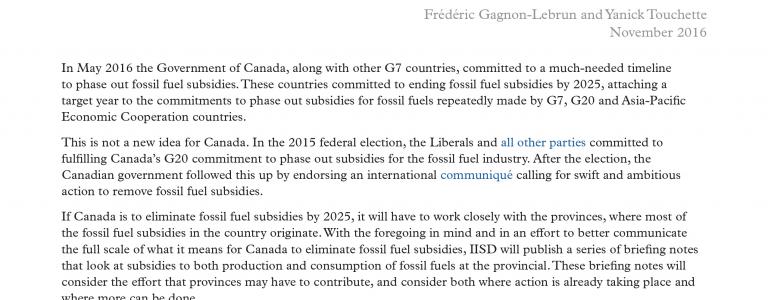Meeting Canada's Subsidy Phase-Out Goal: What it means in Quebec
IISD takes a preliminary look at consumer fossil fuel subsidies in Quebec, which it estimates at roughly CAD 270 million in 2015.
Quebec has taken steps to address its greenhouse gas emissions, most notably through the implementation of a cap-and-trade mechanism. This is definitely a step in the right direction in addressing climate change.
However, as long as fossil fuel subsidies and other financial supports exist, they will continue to challenge efforts to reduce emissions in Quebec as well as meeting Canada’s G7 subsidy elimination target. This commentary takes a very preliminary look at consumer fossil fuel subsidies in Quebec. Our initial research identifies roughly CAD 270 million in 2015 in the form of financial supports for the consumption of fossil fuels.
The supports for fossil fuel use identified here are a good place to start to look at reforms. They are not the only supports in place, and we also suggest increased transparency on the foregone revenue represented by the additional, unquantified items. Subsidy reform should be bundled with other policies that help affected industries and workers to adjust. Here, the federal government will need to work closely with the provinces, including Quebec.
Additional downloads
You might also be interested in
How Fossil Fuels Drive Inflation and Make Life Less Affordable for Canadians
New report takes closer look at how Canada’s dependence on fossil fuels impacts energy costs and prices of essentials such as transportation, home heating, and housing.
IISD Applauds Canada’s Reaffirmation to End Domestic Public Finance for Fossil Fuels in Budget 2024
Today's federal budget announcement delivers new measures to support affordability and reaffirms Canada’s commitments on climate action.
Canada is still backing the fossil fuel industry with billions, report finds
A new report says the federal government is providing billions of dollars in financial support for the fossil fuel industry, despite measures announced last year to limit certain types of subsidies for the oil and gas industry. The analysis, released by the advocacy group Environmental Defence, estimated that Ottawa offered up at least $18.6 billion in support of the fossil fuel and petrochemical industries in 2023.
The Cost of Fossil Fuel Reliance
Government support for fossil fuels reached at least USD 1.5 trillion in 2023, new data shows.
